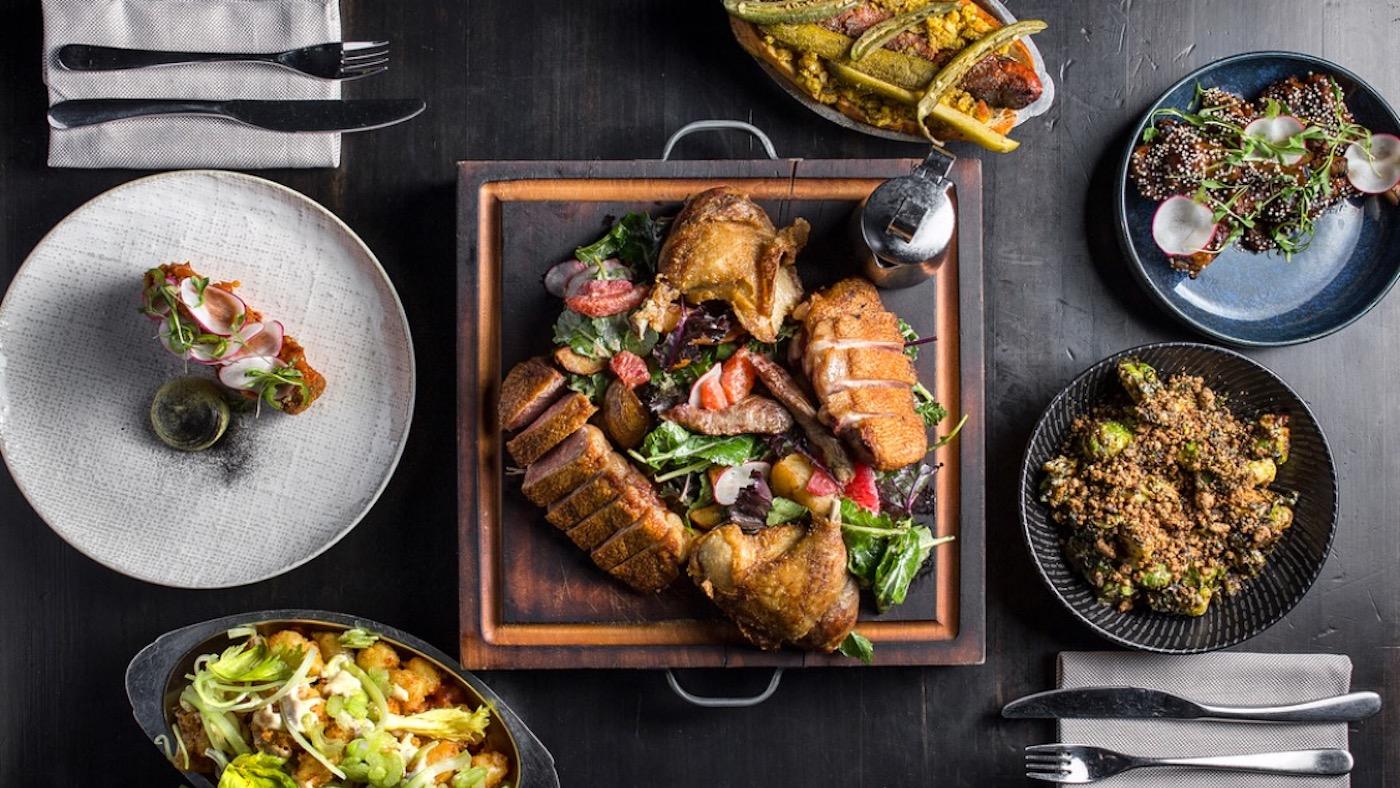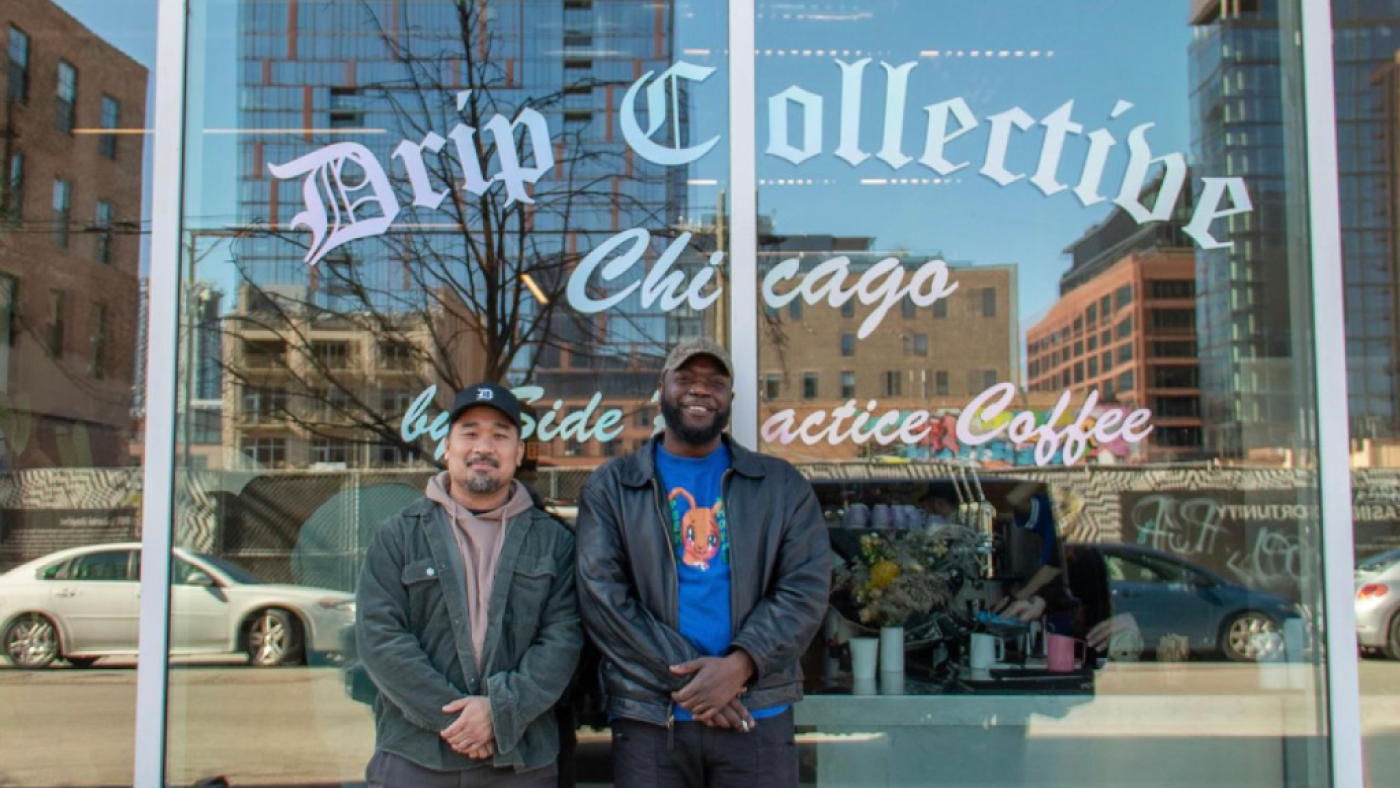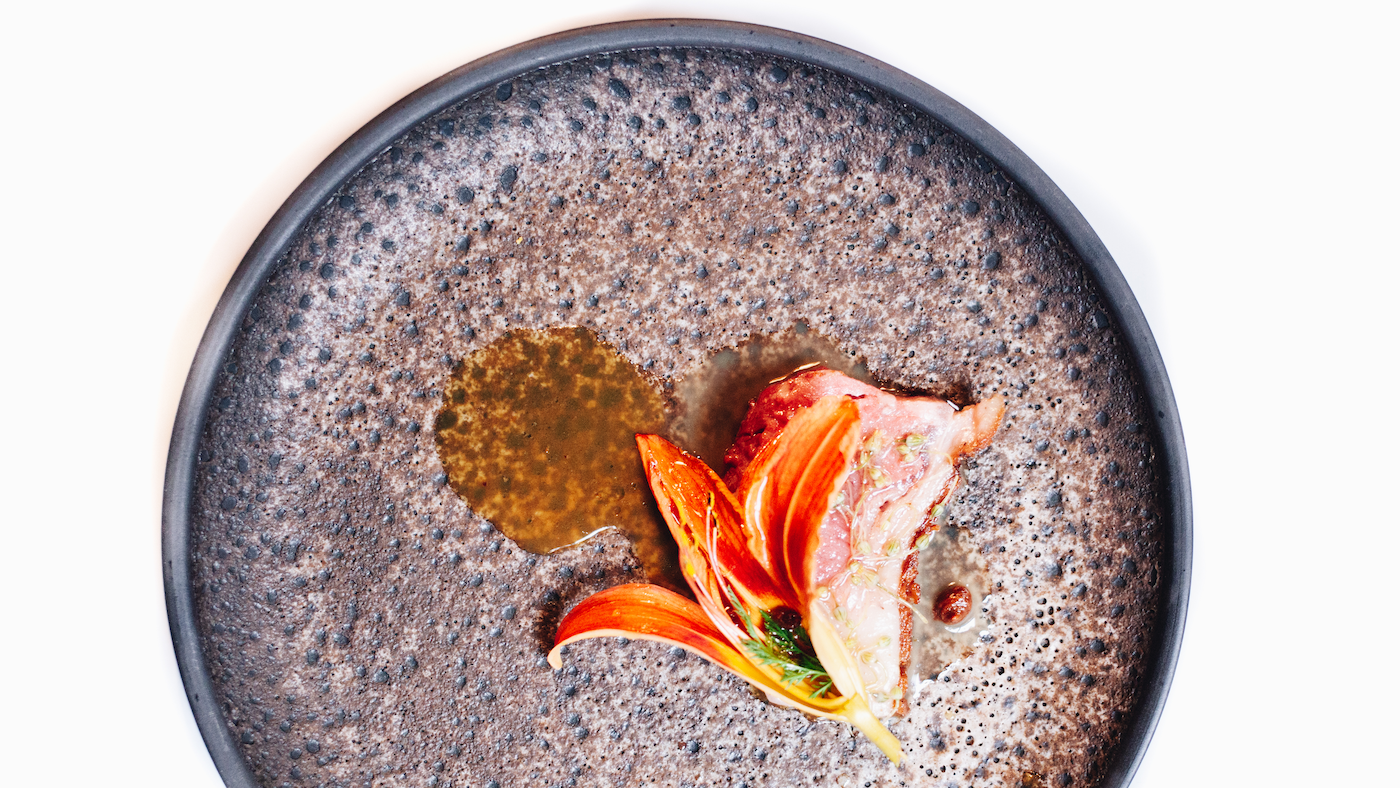For One Budding Chicago Chef, West Side Culinary Training Program Provides Access to Fundamentals
Meredith Francis
March 14, 2023
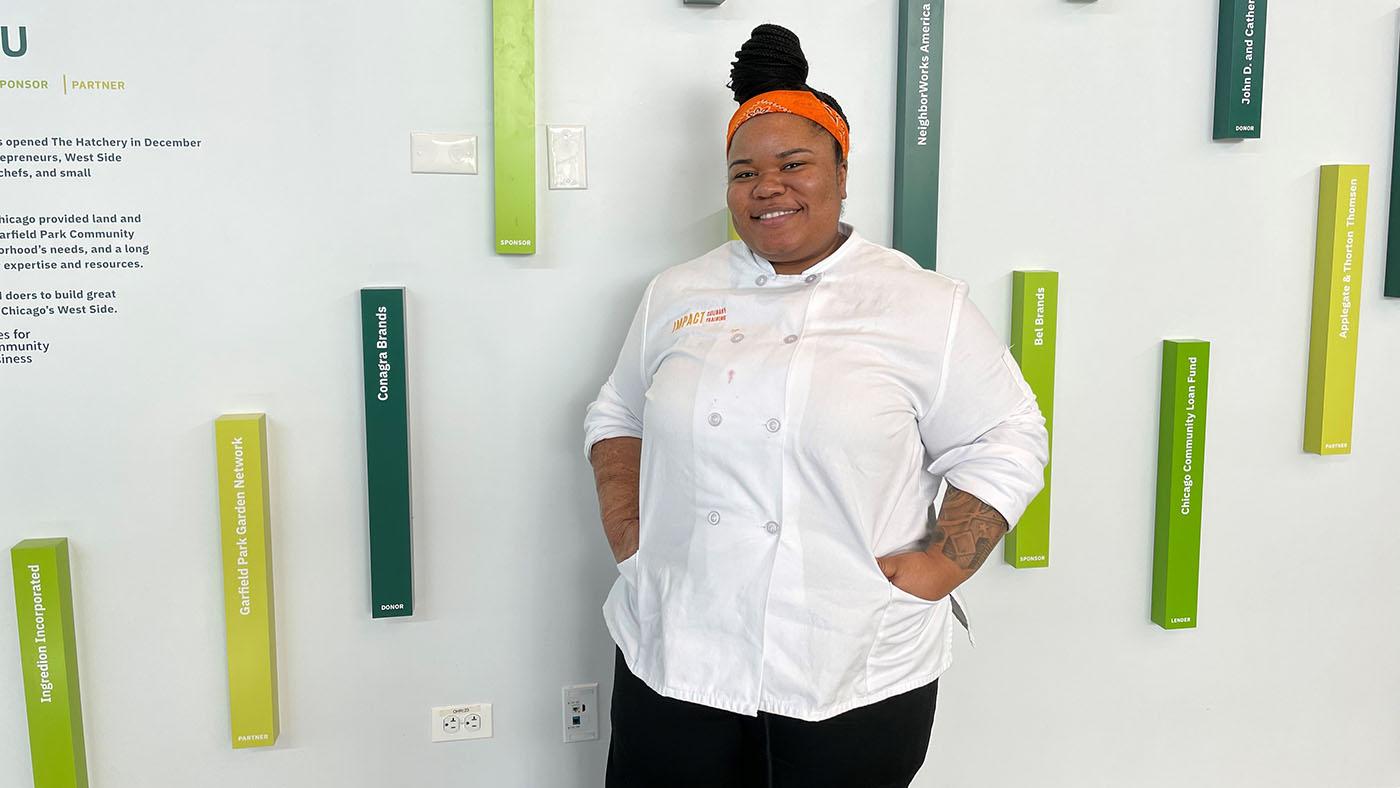
Get recipes, food news, and stories by signing up for our Deep Dish newsletter.
Kiara Jones is proud of the fact that she poached an egg perfectly on just her second attempt. It’s impressive, considering that poaching can be a tricky technique to master: getting the white to stay in one piece and cooking the yolk to the perfect runniness is easier to describe than to do.
Poaching eggs is just one of many skills Jones is learning to master as part of the Impact Culinary Training Program, a no-cost job readiness program on Chicago’s West Side that helps prepare young adults for entry-level jobs in the restaurant industry.
But perhaps it’s not all that surprising that Jones was quick to pick up the skill, considering she first started cooking in 2019. Between her cooking Instagram and TikTok accounts, she already has nearly 700,000 followers. Her recipes for mac ‘n’ cheese and pound cake (especially her lemon-flavored pound cake) are popular with her friends and family.
“What I love about food is it’s sort of like a love language. I feel like that's the easiest way to make somebody happy,” Jones says. “If you prepare a meal for them or if you bake for them, or just getting something comforting to brighten a day, I love when I cook and I see people's reactions when they smile and tell me how good the food is.”
When Jones, 23, found Impact Culinary Training, she thought it would be a good way to enhance some of her cooking skills. Culinary school is expensive, she says, and the program provides a gateway to other community resources.
“Anything that I've ever needed help with or had any questions about, they have a lot of resources, and I really appreciate that,” Jones says.
That’s by design. Impact Culinary Training first started in 2019, and grew out of The Hatchery, a food and beverage incubator for entrepreneurs looking to grow their businesses. (Both fit under the larger umbrella of the Industrial Council of Nearwest Chicago.) Chef Rick Bayless started the training program with a dual purpose: provide young adults an entry point into the culinary world who historically have not had access to it, and help local restaurants hire well-trained staff.
Alicia Feistamel, ICNC’s community resource specialist, says Impact Culinary Training also tries to provide additional support to students, who come from a variety of backgrounds.
“Some of them are single parents. Some have been involved in the criminal justice system. Some are experiencing homelessness,” Feistamel says. “Others have medical or mental health issues. Some have previous substance abuse issues. So it's really an opportunity for them to come as who they are, while also getting support and services to address any type of barriers that they might have that would inhibit them from being successful in a workplace environment.”
That support comes in various forms. Feistamel might help students open a bank account, complete a SNAP or Medicaid application, with referrals for doctors or mental healthcare, or with finding child care.
Students in the program take an eight-week course at the Hatchery, followed by a four-week internship at a Chicago restaurant. While the program targets young people on the West Side, it’s open to anyone (Jones, for instance, is from Auburn Gresham). Students like Jones learn about food preparation, equipment, knife skills, storage, cooking techniques, food math and conversions, nutrition, and food safety. One class might find them mopping the kitchen, while another might find them learning about the parts of a cow and butchering. But in the beginning, they learn the fundamentals.
“That first day is really talking about kitchen culture like, ‘Yes, chef. Behind. In front of you.’ Because there are hot plates, boiling water, and all these dangerous things in the environment. If you're not using your voice to say ‘behind or in front of you,’ it can cause a lot of chaos in the kitchen,” Feistamel says.
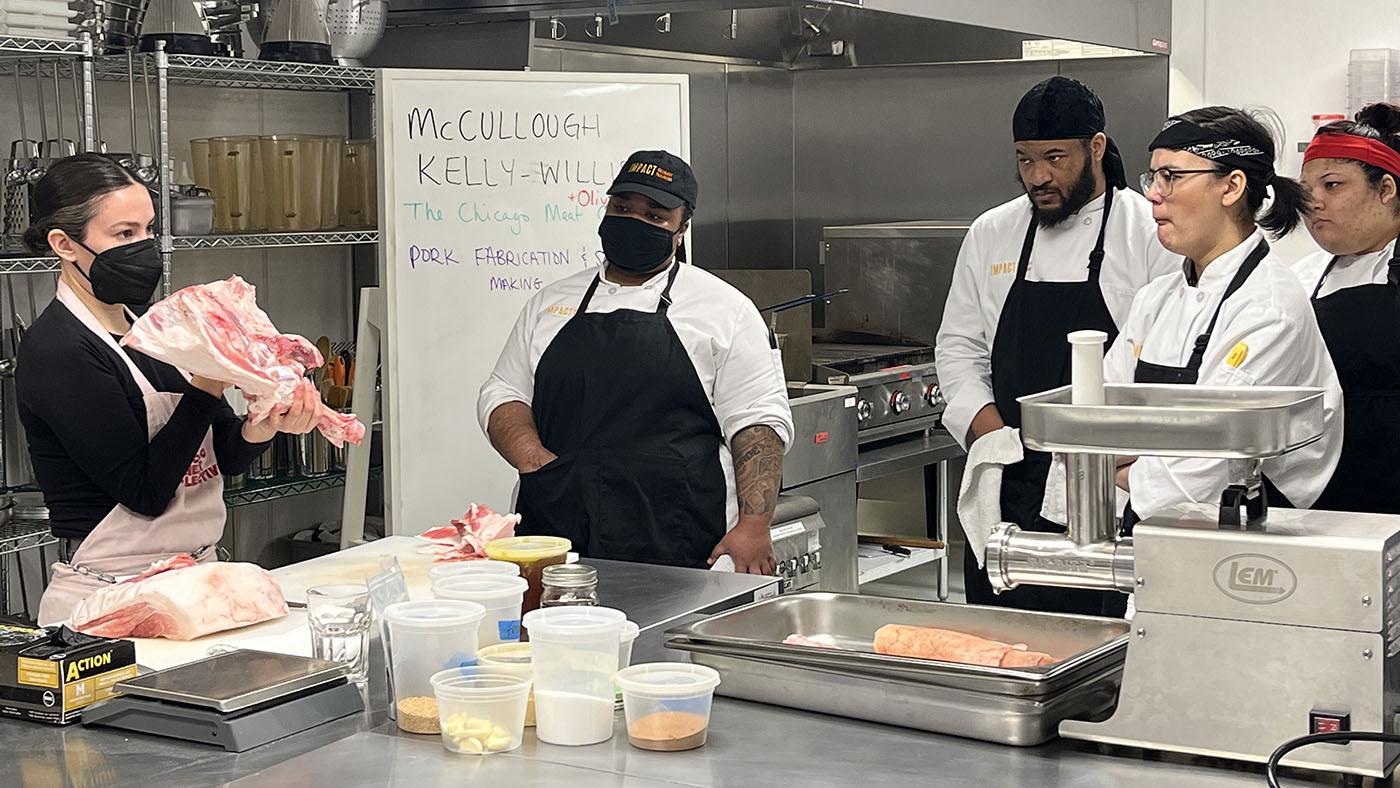 Students learn about butchery as part of their time with Impact Culinary Training. Image: Courtesy of Industrial Council of Nearwest Chicago
Students learn about butchery as part of their time with Impact Culinary Training. Image: Courtesy of Industrial Council of Nearwest Chicago
In a recent week of the program, Jones was in the kitchen learning how to fry chicken and make steak, cooking up some steak tacos in the process. She says some of the professionalism she’s picked up has been a big boost.
“I feel like most restaurants I worked at, I've always felt so overwhelmed or nervous because I never had any real formal training. So I feel like now when I go into the kitchen, I'm way more confident in my work,” she says.
Though the training equips students to become prep cooks, ICNC director of workforce development Priscilla Torrence says the program helps their students think even further ahead.
“We do try to present to them career progression. We're not just training them to be forever prep cooks,” she says. Students might go into restaurants, catering, entrepreneurial ventures, or working at larger, food-related corporations.
Their training also extends beyond the kitchen, with additional classes in what Feistamel calls “soft skills”—beyond just learning how to safely and properly dice an onion, they learn about things like emotional intelligence and money management. While the kitchen skills get them through the door, Feistamel wants them to succeed once they’re in the room.
“These soft skills and emotional intelligence—that's going to help them maintain and retain employment and to further their career pathway,” Feistamel says.
One of the benefits ICNC touts for the program is its length of time. At just twelve weeks, it requires less time than traditional culinary school. And, as Jones mentioned, culinary school is expensive. Providing more access to a wider range of students makes for a more diverse Chicago culinary scene. Diversity, argues ICNC’s marketing and communications manager Devin de Lima, “drives innovation.”
“This type of program is really important because it directly removes the barriers for entry into the food and beverage space,” de Lima says. “If we are able to bring in those who are locally West Side residents who were not necessarily given a fair shot at the food and beverage industry from the start … it’s only going to further drive the innovation of Chicago’s food and beverage industry."
Jones, meanwhile, is eager to start the internship phase of the program. She dreams of becoming a travel chef who cooks for celebrities. She’s off to a good start there, too, since she has her own catering business called Unique Eats Catering. Wide receiver Darnell Mooney saw her social media and messaged her saying he wanted to try her food, so Jones has now done some private chef work for the Chicago Bears. Jones’ dream of becoming a private chef includes one other person, too.
“I have a three-year-old daughter, and she's my biggest motivation for everything. I'm pretty much doing this to create a better life for me and her,” she says.
Her daughter is pretty into chicken tenders these days, and she also loves the fries that Jones makes from scratch. Her daughter has gotten used to having a budding chef for a mom.
“I tried to make the [fries] from the freezer, but she's bougie now,” she says with a laugh.
With those sophisticated taste buds, Jones’ egg poaching skills might end up coming in handy for her toddler, too.

